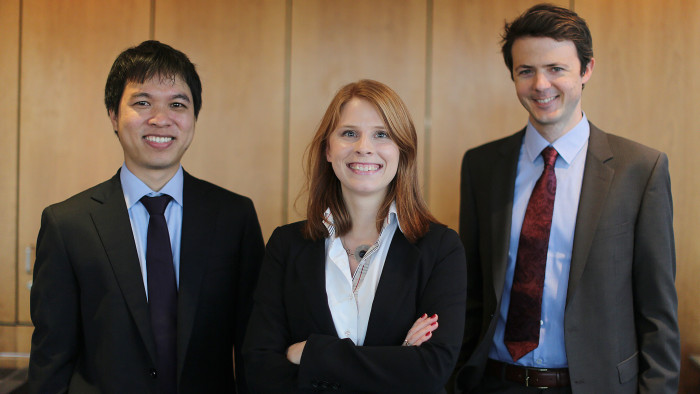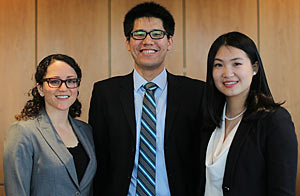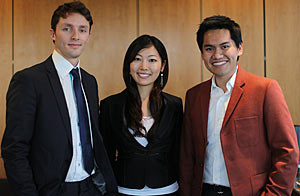MBA Challenge winners reach for the stars

Roula Khalaf, Editor of the FT, selects her favourite stories in this weekly newsletter.
The winning team of this year’s FT MBA Challenge was aptly named Per Aspera Ad Astra, a Latin phrase which roughly translates as “through hardships to the stars”.
The team, which was made up of eight students studying at the University of St Gallen in Switzerland, Johns Hopkins University and Nanyang University in Singapore, won the challenge to help a grassroots organisation achieve sustainable business growth in collaboration with the Global Fund for Children. Like their fellow participants, they had to do so without visiting their project and without being able to meet directly all their team members who were spread around the globe.
Per Aspera Ad Astra worked with Fundación Promoción Humana a charity based in Colombia that helps children aged six to 14 to succeed in school by providing additional education programmes. It funds its activities through selling pizzas, ice-creams and notebooks.
“Team Per Aspera Ad Astra’s project had actionable suggestions which would have the most impact on the recipient. They did some good fundamental business analysis and their suggestions were not only specific but also closely linked to the educational heart of the mission. They were clear and specific about how to scale up the revenue-generating opportunities,” said Natasha Braginsky Mounier, vice-president and equity investment analyst at Capital Group and one of nine judges on the panel.
Applying skills learnt on their MBA courses, Per Aspera Ad Astra consulted with the charity over the summer and advised FPH to scale up its pizza shop by making it more unique and aligning it more closely with its mission in education, for example by using pizzas as incentives for the children to achieve educational goals.
“It is proposed that FPH’s pizza shop uses the successful example of Pizza Hut’s BOOK IT initiative in the US on literacy. The initiative consists in working together with teachers and librarians and giving reading objectives to children. Once the students reach the objective, they get a free pizza, which fosters their motivation to learn,” the team wrote in its recommendations report.
The team also advised improvements in the notebooks initiative, suggesting the charity source paper fibre locally and create apprenticeships for their students in the paper manufacturing business. It also advised including stories, proverbs and maths problems at the bottom of each page to encourage students to continue learning in a fun way.
“With these features, it is proposed that the notebooks are sold at a similar cost to the ones of competitors… The additional revenues could then make up for the possible increase of production costs due to the new proposed features. The production partner would benefit from the partnership because of its association with the FHP branding, which will be very beneficial in its communication strategy. Furthermore, because of the scaling-up opportunities, the revenues gained from producing the notebooks will also increase.”
Meret Brotbek, team leader of Per Aspera Ad Astra and an MBA student at St Gallen believes the team managed to define a clearer vision and strategy for FPH. The MBA lessons she found to be the most useful were those on strategy, social entrepreneurship, impact investing, corporate sustainability, project management and team coordination. “Our partner organisation had strong leadership but it was lacking a clear strategic vision. We loved consulting for them because they have a great cause and were very motivated,” she says.
In second and third place in the challenge came Team Banana and Team Global Grassroots respectively. Team Banana represented students from the London School of Economics, Nanyang Technological University in Singapore, the National University of Singapore and UCLA Anderson School of Management in the US. Its partner charity was Karm Marg, an organisation in New Delhi, India that runs a home for street children.

“Initially we were concerned that Karm Marg was over-committed, and trying to do too many things, but after speaking with Veena Lal, the founder and chairman, we realised that her vision is all-consuming and that all her efforts are connected to the organisation’s primary mission: to raise responsible citizens of the world,” said Elizabeth Shavelson, a member of the team currently studying for an MBA at UCLA.
The team produced recommendations focused on this vision. For example, they advised the charity to redesign the website of its social enterprise, Jugaad so that it tells their story more clearly. Jugaad sells goods made from recycled materials by local women and young adults.
“The website design currently leans towards a pure sales platform – it focuses on Jugaad’s products online. However, to better promote Jugaad’s products and the social value the goods inherently possess, the website needs to fully integrate Karm Marg’s story, mission and accomplishments. Karm Marg is the key differentiator in Jugaad’s products and highlighting their intrinsic link will develop and strengthen its brand,” Team Banana wrote in its proposal.
Ms Shavelson said the experience underscored the importance of flexibility and adaptability in creating a cohesive and context sensitive strategy for sustainability. She now plans to visit Karm Marg with the rest of her team to witness the impact its projects have made in the local community. “We are fortunate to be pursuing an MBA at a time when social responsibility is becoming more prevalent within management education,” she said.
Team Global Grassroots represented students studying at Iese Business School in Spain, Essec Business School in France, Tuck School of Business at Dartmouth College, Northwestern University Kellogg School of Management and Medill School of Journalism in the US.

The team members worked with Alliance for Children and Youth, an organisation that offers support to homeless and unemployed young people in Bulgaria.
“Many people don’t mind giving small sums of money to the needy every now and then… ACY could partner with telecom and internet companies, such as eBay and PayPal, so anyone can use their browsers or mobile phones to donate to its causes. ACY currently has a mobile partner, M-Tel, for this purpose, but the team recommends approaching an alternative carrier, such as Globul, that is more active and socially-orientated,” Team Global Grassroots wrote.
The judges said they were impressed by the quality of recommendations submitted by all three teams.
“Team Banana had some good analysis and suggestions too [only] they were not realistic about the capability of an NGO to implement some of the ‘MBA concepts’ like Total Quality Management,” adds Ms Braginsky Mounier who is an MBA graduate of Harvard Business School. “Team Global Grassroots was a well structured and comprehensive team effort. They had excellent suggestions for utilising the skillset of the organisation to do teacher training and surveys.”
The FT MBA Challenge will run again in 2014, email mba.challenge@ft.com for further details.
Comments